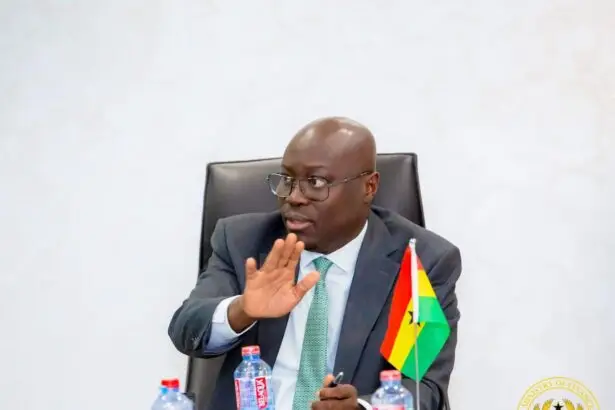We’re determined in our decision to fully restore the economy – Ato Forson on Fitch upgrade of Ghana
We’re determined in our decision to fully restore the economy – Ato Forson on Fitch upgrade of Ghana

Finance Minister Dr. Cassiel Ato Forson has reassured Ghanaians that the John Mahama-led administration is committed to fully reviving Ghana’s economy and bringing long-term relief and prosperity to its citizens. This assurance came in response to a major economic development: international credit rating agency Fitch Ratings upgraded Ghana’s Long-Term Foreign-Currency Issuer Default Rating (IDR) from “Restricted Default (RD)” to “B-,” signaling renewed international confidence in the country’s financial health.
The improved rating reflects the normalization of Ghana’s relationship with most of its external creditors. The country successfully restructured $13.1 billion in Eurobond debt as of October 2024, and only about $2.6 billion in external debt remains to be addressed. Fitch views only $700 million of this as unresolved commercial debt and considers the risk of creditors holding out to be low.
Ghana has also made considerable progress in handling bilateral debts. In January 2025, the country ratified an agreement to restructure $5.1 billion of its official bilateral debt. The remaining debt to be restructured includes $1 billion owed to multilateral institutions and $840 million to other official creditors. Fitch expects that Ghana will fully complete all restructuring processes by the end of 2025.
On the fiscal front, Ghana faced a higher-than-expected primary fiscal deficit of 3.9% of GDP in 2024 due to election-related spending, up from 0.2% in 2023. While this overshoot continues Ghana’s historical pattern of fiscal slippage during election years, the new government plans to reverse the trend. The target is to achieve a 1.5% primary surplus in 2025, mainly through cuts in primary expenditure. Fitch, however, forecasts a more conservative 0.5% surplus in 2025 and 0.9% in 2026, citing inflation pressures that may slow down the pace of consolidation.
Regarding debt service, Ghana’s foreign-currency debt obligations are expected to be manageable. Payments will total approximately 1.2% of GDP in 2025 and 1.4% in 2026, assuming the remaining restructuring is completed. Interest payments alone will be about 0.5% of GDP in 2025. Ghana’s reserves have recovered significantly, reaching $6.8 billion in 2024, and this upward trend is expected to continue, providing a buffer for meeting future obligations.
On the domestic front, local-currency debt service is projected to be around 3.8% of GDP in 2025, with interest payments accounting for most of this figure. Principal payments on domestic bonds will spike in 2027, coinciding with the maturity of bonds from the Domestic Debt Exchange Programme (DDEP). However, Fitch is confident Ghana can meet these payments, especially if inflation continues to decline and domestic capital markets stabilize.
The interest-to-revenue ratio, a key measure of a government’s debt burden, is expected to stay around 26% in 2025 and 2026. Though significantly lower than the 48% peak in 2021, it still exceeds the typical range for countries in the same credit category and remains a constraint on Ghana’s credit rating. However, falling yields on treasury bills and improved domestic borrowing conditions have helped ease liquidity concerns.
Ghana’s public debt is expected to decline sharply from 72% of GDP in 2024 to 60% in both 2025 and 2026, thanks to fiscal consolidation, restructuring efforts, and recent appreciation of the Ghanaian cedi. This is a significant improvement from the peak debt-to-GDP ratio of 93% in 2022, when Ghana defaulted on its debt.
In external trade, Ghana recorded a current account surplus of 4.3% of GDP in 2024 — the highest in years — due in large part to strong gold exports. However, Fitch projects the surplus will narrow to 1.1% by 2026 as imports rise and export prices decline. Despite the narrowing surplus, it still compares well to the average deficit among countries with a similar rating, allowing Ghana to continue building up its reserves.
Inflation is also expected to decline steadily. From a high of 23% in 2024, Fitch forecasts inflation to average 15% in 2025 and fall to 10% by 2026. The sharp appreciation of the cedi in recent months, along with tighter monetary policy and lower global oil and food prices, is expected to help reduce inflation further. The Bank of Ghana is projected to begin reducing interest rates starting July 2025.
Despite the economic hardships and debt restructuring, Ghana’s economy has shown resilience. Real GDP grew by 5.7% in 2024, up from 3.1% in 2023, and is projected to grow by 4% in 2025 and 4.5% in 2026. This growth will be driven by a recovery in agriculture, especially cocoa production, and continued expansion in industry and services.
On the governance side, Ghana receives mixed ratings. Fitch notes the country’s relatively stable political environment, strong institutions, and established legal framework. However, issues related to corruption, political rights, and rule of law continue to weigh on its Environmental, Social, and Governance (ESG) profile. Ghana scored below the 50th percentile in most World Bank Governance Indicators, which negatively affects its overall credit standing.
Looking forward, Ghana’s rating could be downgraded if the government fails to consolidate its finances, faces renewed liquidity pressure, or struggles to refinance its debts. On the other hand, the rating could be upgraded if the country sustains a steady decline in its debt levels, continues to build foreign reserves, and further stabilizes its economy.
Overall, Fitch’s latest rating reflects growing confidence in Ghana’s economic recovery. With ongoing reforms, prudent fiscal management, and the gradual rebuilding of investor trust, Ghana appears to be on a path toward long-term financial stability.





